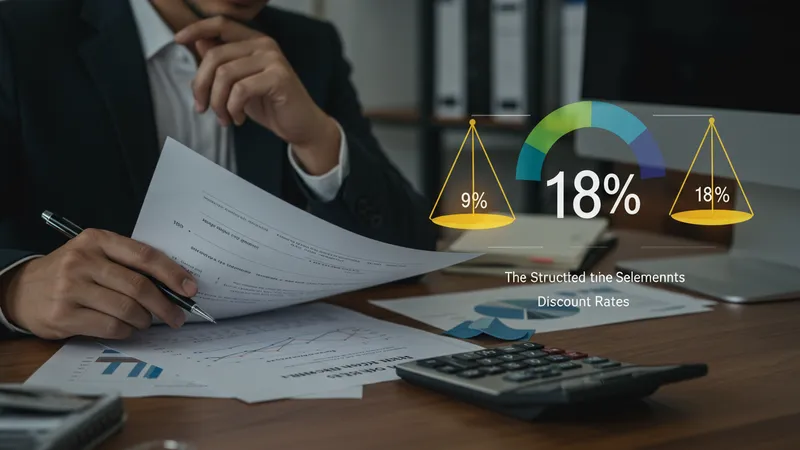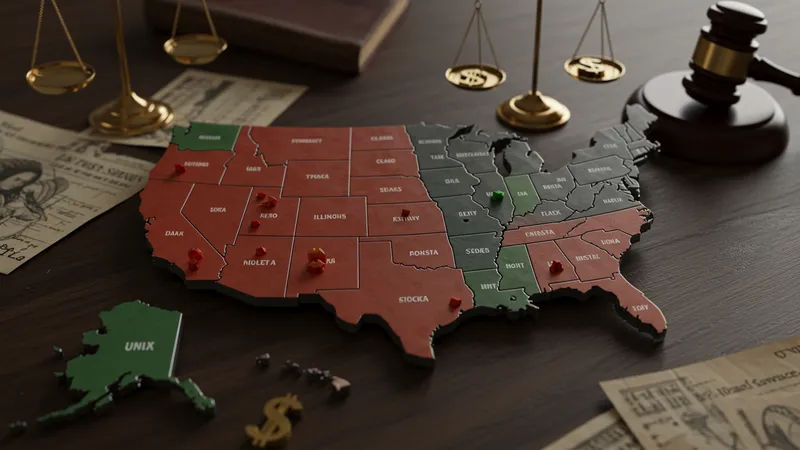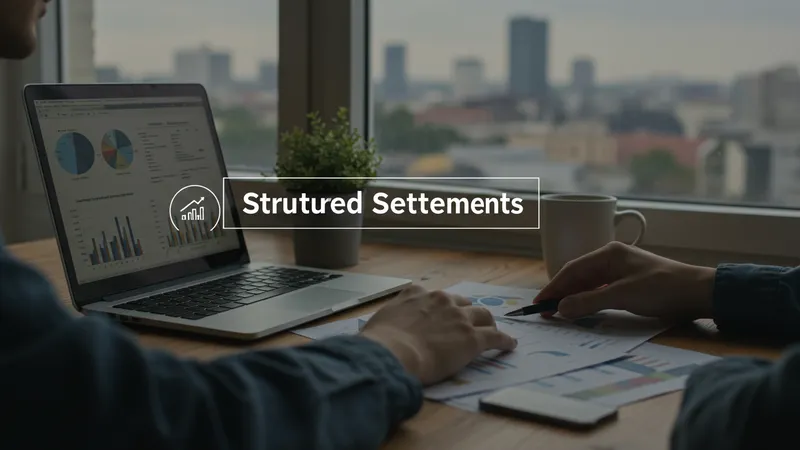Did you know you can sell your structured settlement and get a lump sum? It sounds almost too good to be true, but thousands of people do it every year. This secret financial strategy may just change your life.
With the current economic upheaval, the power to convert regular settlement payments into immediate cash offers a unique lifeline. Here's why understanding this process is crucial right now for savvy financial planning.

What if I told you the original concept of structured settlements began as a way to support accident victims? Yet here we are, with a legal framework that allows people to trade this slow trickle of cash for an instant influx. But that’s not even the wildest part...
Perhaps the most shocking element is how this decision can fundamentally alter your financial future. It’s like opening a personal treasury vault when you need it most. Many felt skeptical initially but changed everything after they made their first move. But what happens next shocked even the experts...
Structured settlements gained prominence in the late 20th century as a more humane way to compensate injury victims. The idea was simple: instead of one large payment, which can quickly dwindle, recipients receive a series of smaller, tax-free payments. This safety net has opportunities that few were aware of. But there's a twist that few predict…

Backed by the Periodic Payment Settlement Act of 1982, these were a product of carefully crafted laws designed to protect recipients. By spacing out payments, the risk of mismanagement lowered significantly. Yet, ironically, the desire for liquidity often pushes people to seek lump sums regardless of these benefits.
What if the option to sell wasn’t just a loophole but a cornerstone of financial flexibility? The truth is, you could bypass traditional constraints. But there's still another revelation waiting…
Over time, the secondary market for structured settlements blossomed, breeding a roster of companies eager to buy settlements. Each promises quick cash to those tired of waiting. But there’s one more twist that might just surprise you…
Selling part of your settlement isn’t merely a handshake deal. In fact, it involves navigating a maze of legal steps meant to ensure fairness and transparency. The process usually starts with finding a buyer you trust, then working through the paperwork. But trust me, this is just the tip of the iceberg…

A court must approve your decision to sell, safeguarding your interests even when you’re eager to exchange payment streams for a bulk amount. This step is crucial, as it validates if the sale serves your best interest. After all, fast cash can be tempting but requires careful consideration.
But are all deals equal in the eyes of the court? Interestingly, judges often scrutinize the offered discount rates — sometimes rejecting deals deemed too one-sided. It's their call to make sure you're not diving off a fiscal cliff.
However, the true impact of selling a settlement begins unraveling only when you hold that lump of cash. The reality checks can amuse or alarm. Keep reading to learn how this financial move ripples into various aspects of life…
Many focus on the spectacle of receiving their lump sum, forgetting the behind-the-scenes costs that can chip away at their newfound wealth. Unseen fees and surprise taxes often lurk, shrinking what you thought you'd walk away with. Could this be why some regret their decision?

Fees from the transaction, legal services, and potential tax implications vary widely across different states and cases. Understanding these before diving in is essential, yet brushed aside by the excitement of fast cash. But as they say, forewarned is forearmed.
Ever wondered why some people end up with far less than anticipated? The discrepancy often arises from not accounting for inflation, which effectively eats into the purchasing power of the lump sum. This knowledge could pave new avenues for wiser financial decisions.
Still, many find themselves blindsided despite the available information. The allure of immediate cash can cloud judgment. But what you read next might change how you see this forever.
Negotiating the terms of your sale can dramatically affect the outcome. Picking the right buyer is crucial, as not all offer the same value or transparency. While it’s about the money, it’s equally about the process and your peace of mind.

Shopping around and getting multiple offers is a premier strategy suggested by financial advisors. The variance in offers often surprises sellers, highlighting the importance of not settling for the first bid. Your deal is only as good as your diligence.
Interestingly, some seasoned negotiators leverage time-sensitive needs against buyers. Creating a competitive environment among potential buyers can tilt the scale in your favor. Yet, there’s more still to learn about optimizing this process…
Perhaps, what most fail to realize is that crafting your best deal isn’t about sheer luck but informed strategy. The upcoming pages will delve deeper into advanced tips that could redefine your approach.
For every tale of triumph, there are cautionary stories that underline the importance of carefully weighing one's options. From clients overwhelmed by the reality of their deal to those who struck their balance heroically, there’s much to learn.

Consider the case of Mark, who hastily sold his settlement at a steep discount, only to hit unforeseen medical bills he couldn’t cover. His story is a stark reminder of the potential pitfalls in making financial decisions under duress.
Contrast that with Lisa, who took the time to fully understand her agreement and reaped rewards far above average. Her patience and strategy paid off, showcasing that calculated moves often trump fast decisions.
The spectrum of outcomes from different case studies paints a vivid picture. Whether you’re nearing a decision or already set, these experiences provide lessons invaluable for the informed individual. Perhaps the deeper analysis might reveal the key to your success.
Navigating the sale of structured settlements can be daunting, which is why many seek guidance from financial advisors. Yet, their role in this process often goes unnoticed. Could they be the missing link in your financial strategy?

Advisors offer more than just guidance; they provide access to networks and insider knowledge that can enrich your decision-making process. Their expertise often means avoiding common traps that ensnare less informed sellers.
However, selecting the right advisor is crucial. Not all are created equal, and aligning with one who truly understands your financial landscape is key. But what truly differentiates great advisors from the rest?
In the upcoming sections, uncover the insights of top financial advisors and how their inputs could make or break your sale outcome. You might find their perspectives surprisingly transformative.
Beyond the financial logistics, selling structured settlements is an emotional journey with its own set of challenges. Anxiety before court dates, the thrill of approval, and the bittersweet acceptance of cash are part of this unpredictable ride.

Many don’t realize that parting with what was designed to secure your future is a complex emotional process. The safety net, once offered tranquility, now transforms into a formidable lump sum with both opportunity and regrets.
Balancing the emotional highs and lows can be difficult, but understanding the psychological triggers is crucial. Are you making decisions rooted in immediate needs or balancing them with future stability?
In the pages ahead, delve deeper into understanding these emotional factors and discover strategies to maintain emotional and financial well-being during this transition.
Understanding the actual financial implications of selling your settlement often entails more than mere arithmetic. The real calculations involve projecting future inflation, opportunity costs, and understanding present value.

How much would you lose or gain in the long run? Tools like present value calculators offer a glimpse into how future payments measure against an immediate lump sum. Surprised by the outcome? Many are.
Unpacking the numbers can demystify the process, enabling sellers to see the bigger picture. How do these calculations affect the final decision-making process, and do people often undervalue them?
Yet, many still skip this critical step, diving headfirst into decisions that might not serve them well. The more pages you read, the clearer the paths reveal themselves, enhancing your understanding of this intricate process.
The discount rate is a significant factor when selling structured settlements. It represents the reduced value a buyer offers to take over your future payments. But how are these rates determined, and are they truly fair?

Many sellers are surprised to learn that discount rates vary between 9-18%, significantly affecting the final amount they receive. Learning to negotiate these rates can turn the tide in your favor, significantly impacting your final takeaway.
It’s crucial to question the initial rate you’re quoted and actively seek better offers. A 1% difference on a substantial amount can translate to thousands of dollars saved or lost. How does one effectively bring down this rate?
In addressing these concerns, the key question remains: how much negotiating power do sellers really hold? The following pages will enlighten your understanding and arm you with the knowledge needed to emerge victoriously.
Different states in the US have varied laws and regulations surrounding the sale of structured settlements, which can significantly affect the process and outcome. Some states impose higher taxes, while others have more favorable legislation for sellers.

Understanding these differences can be a deciding factor in the success of your sale. For instance, states like Illinois offer more protection for sellers, while others might present additional hurdles. Could relocating your settlement be an unforeseen strategy?
The quirky and often hidden differences between state tax implications and court approval processes can heavily influence your decision. It’s fascinating what a change of location might entail.
Navigating these state-specific regulations could be complex, but with guided insight, it becomes manageable. The upcoming discussions delve into navigating this legal labyrinth efficiently.
As enticing as selling structured settlements is, it's not the only option. Some opt to keep their arrangements intact, finding ways to further leverage the existing regular payments without selling.

Many are curious about options like using settler annuities as collateral for loans. These alternatives keep your settlement intact while offering temporary cash flow. It’s a lesser-known tactic that holds potential for strategic financial management.
How do you leverage these lesser-known strategies to your advantage? A structured settlement loan might be less glamorous but offers a path for maintaining future security.
This approach offers a fresh perspective, providing opportunities without relinquishing long-term stability. More insights await you, promising strategies to keep you both informed and empowered.
Structured settlements are only growing as a choice for settlement earnings. But how will this market evolve? As financial technology advances, the way people engage with settlements is bound to change.

Innovations like blockchain may redefine how structured settlements are handled, introducing transparency and efficiency. These technological leaps could trigger shifts in how and when people choose to sell their settlements.
The future of structured settlements offers exciting possibilities, and staying ahead is crucial. What if tomorrow’s technology allows instantaneous, tax-free transactions without complexity?
The landscape we see now could drastically evolve, and with it, the options available to individuals weighing selling versus keeping. Your exploration today provides foresight for a more informed tomorrow.
Before jumping into any decision, prepare by gathering thorough information and understanding every aspect of the sale. Reading case studies, understanding legal terms, and crunching numbers are just pieces of the puzzle.

Preparation involves a blend of knowledge acquisition and emotional readiness. The choice ultimately reflects both your immediate needs and long-term objectives. But what unique steps can you take to ensure readiness?
The more informed you become, the more empowered you are to make decisions that protect your interests. Many miss this step, leading to less favorable outcomes.
Your journey through this article marks the beginning of a well-informed roadmap. Keep going, and make your path through this financial decision clear and confident.
As you can see, the decision to sell or keep your structured settlement involves a complex web of financial, legal, and emotional considerations. It's a journey through the unexpected and the enlightening, where each choice may ripple into every corner of your financial future.
This exploration leaves you standing at a crossroads, equipped with the insights and strategies to weigh your options wisely. Whether choosing liquidity or stability, you're now armed with the knowledge to navigate this financial landscape. Share this with others in similar situations, bookmark this resource, and continue your quest for informed financial decisions. The possibilities are endless.